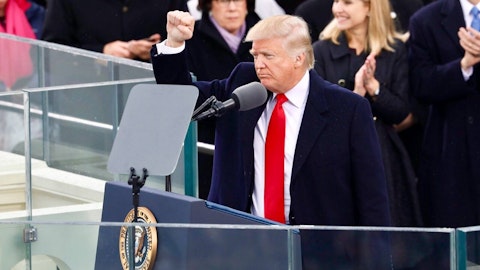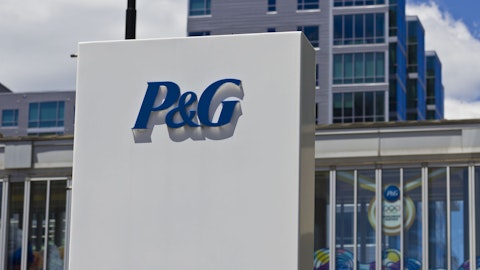And one of the things that frankly I’m quite pleased with is, if you look at all those chemical investments that we brought online, even in the depths of what is a pretty low bottom of cycle condition for our chemical business, all of those brand new projects are earnings positive and cash positive, which I think really bodes well for when the market comes back up and we’re at top of cycle. So, I feel good about how we position the business and, frankly, we’re doing exactly what we had hoped for, which is, when you get into tough conditions that our business continues to outperform competition. And so it puts us in a good position as markets tighten back up again and margins improve we will be in an even better position.
Kathy Mikells: And I would add a couple of quick stats to that. So relative to competition, again, our geographic footprint is pretty advantaged. And so, we’re about 35% larger in North America than, I’ll call it, rest of industry. And then the other thing I’d point out that gets to what Darren just said about some of the projects we’ve been implementing, those projects helped to support an improvement in our overall mix. And so, this quarter, we saw a 6% increase in performance chemical products and those carry a higher margin. So those are some of the more systemic things that help to drive improvement relative to competitors.
Roger Read: Great. Thank you. Follow-up question on the carbon capture side of the business. If we look, we’ve got global coal demand hitting a record in 2023, global oil demand is going to hit a record in 2023, if it hasn’t already. Just curious, Darren, is there — when you were — you’ve already laid out your strategy, all that makes sense. The Denbury acquisition certainly fits well in that. Just curious if you’re getting any additional sort of outside pressure to maybe accelerate something on this, given that, if you think about it from an energy transition standpoint, two or three years ago, everybody was saying we would have already had peak demand for this, peak demand for that, clearly not happening. If we’re going to have a lot more carbon emissions, are you getting any additional pressure to accelerate carbon capture?
Darren Woods: Yes, I think what you’re seeing today is a reflection of the challenge that the world faces, and frankly, an incomplete solution set. And I think unfortunately the focus, if you go back several years, and I would say the exclusive focus on wind, solar and EVs and the fact that other alternatives and other solutions that frankly at the time we were advocating for and in fact trying to develop internally weren’t considered or actually — weren’t actually accepted as slowed society’s progress and its emissions reductions in capturing. I think today, there’s this recognition that we need more solutions and that frankly the industry can bring those solutions to bear. And at this stage of what is going to be a very complicated and expensive transition, we need as many solutions on the table as possible.
Not eliminating any of them and staying focused on emissions reductions. I think that’s starting to resonate. And so, I don’t — the challenge here is, this is a very nascent, the areas that we’re focused on, which are the molecule oriented parts of the business that are very consistent with our capabilities and expertise and advantages, that’s a — we’re in the very early stages. Frankly, we’re in the lead in that space. There aren’t any other companies that have secured the kind of third party mission reduction opportunities that we have that would — there aren’t any parties out there that have got the scale of the investments that we’re progressing. And so, I think generally, people recognize that we’re delivering on our ambition to lead the industry.





